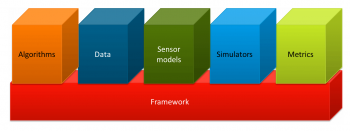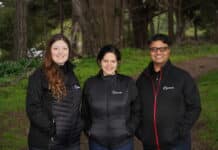This software framework allows the algorithms to be compared, side-by-side, in a “bake-off” against realistic data.

The UK’s Defence Science and Technology Laboratory (Dstl) has released a new open-source software framework to help improve tracking technology.
The framework, called Stone Soup, has been developed by 5-eyes nations of UK, USA, Australia, NZ and Canada, with Dstl leading the project. The multinational collaboration aims to provide the target tracking and state estimation community with a framework for the development and testing of tracking and state estimation algorithms.
According to Dstl, tracking and state estimation is a vital part of defence research. “Being better able to track enemy missiles, vehicles or drones is essential for operational effectiveness. However, the algorithms that crunch the data are complex and difficult to compare. This software framework allows the algorithms to be compared, side-by-side, in a “bake-off” against realistic data,” it said in a press release.
Dstl has made the project available to anyone wanting to upload and test their tracking algorithms.
The Stone Soup project and its uses
Stone Soup has six component types: framework, data, algorithms, metrics, simulators, and sensor models. The framework is the core of the project. The framework is a software architecture which allows code components to be plugged-in in a modular fashion, such as algorithms, sensor models and simulators.
Users can then model a huge number of outcomes, which can be measured on how they improve survivability, safety or operational effectiveness.

This software also has applications in non-defence areas: such as for tracking systems in self-driving cars.
In addition, the project will facilitate and encourage other algorithm developers or tracking practitioners to insert their new components, which can then be compared alongside accepted or state-of-the-art algorithms to help the developers and industry/Government laboratories evaluate them against standard data sets. Alternatively, industry can insert their own data into the framework and run this against the standard suite of tracking algorithms it contains.
“One day this could provide better tracking capabilities for a whole range of difficult problems such as following a swarm of fast drones, tracking space-clutter around the International Space Station or understanding the movements of migrant vessels in the Mediterranean,” Dstl noted.
The project will largely benefit academic and Defence community
The initiative is supported by four other nations’ Defence labs, including Defence Research and Development Canada, which is contributing to its development.
Professor Paul Thomas, a Senior Principal Scientist at Dstl, said, “We are really excited to be making Stone Soup available to other tracking practitioners giving us the potential to be high-impact in multiple communities. It’s a ‘standard’ platform for tracking algorithm development, and for testing and benchmarking, which will be a huge benefit for the academic and Defence community.”
According to Thomas, the framework is in its infancy. The long-term aim is to save lives by having data that can accurately track adversaries, giving commanders in the battlefield full situational awareness, he added.
The reason behind naming the project as “Stone Soup”
Stone Soup is an old European folklore, which teaches us that “By working together, with everyone contributing what they can, a greater good is achieved.”
While in the case of the original story the soup is shared among the villagers, the Stone Soup scientist team believes that the output from their collaboration will remain to benefit everyone into the future.
“Stone Soup is a fantastic tool with so many benefits; I hope lots of experts can join us in using and contributing to this framework,” Thomas said.
The software is now available on Github under MIT License.











































































